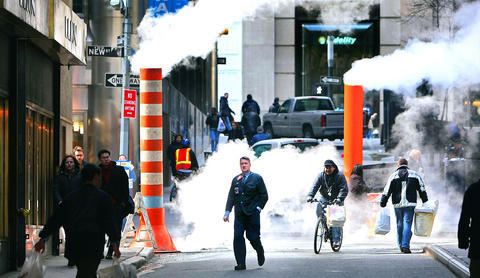The gloom on Wall Street remains after a failed rally effort and investors still skittish about how far and how fast the US economy will sink.
Volatile trade has persisted, with the past week marked by three days of gains that were erased by two negative sessions.
Some analysts expect the stock market and the US economy to emerge from its funk later this year, but others worry that the worst has not been priced into shares.

PHOTO: AFP
The Dow Jones Industrial Average lost 0.93 percent for the week to end Friday at 12,266.39.
The tech-dominated NASDAQ composite lost 1.38 percent for the week to 2,271.48 and the broad-market Standard & Poor's 500 index shed 1.66 percent to 1,330.63.
The markets closed out last month with a second consecutive monthly loss. The Dow is down by 7.5 percent since Jan. 1, with the S&P some 9.4 percent lower and the NASDAQ down 14 percent.
Federal Reserve Chairman Ben Bernanke did little to reassure nervous investors over the past week.
Delivering his semi-annual report to Congress, the Fed chief said the economic picture remains weak and that the Fed's job is complicated by high oil prices that have fueled inflation.
"Investors have been hit by a ton of fundamental negatives," market strategist Al Goldman at AG Edwards said.
"This raises the question of whether or not the market has been able to discount all the known problems and even some of the unknown ones," he said.
Bonds strengthened as investors looked for safe havens. The yield on the 10-year Treasury bond fell to 3.534 percent from 3.790 percent a week earlier, while that on the 30-year bond eased to 4.420 percent from 4.582 percent.

When Lika Megreladze was a child, life in her native western Georgian region of Guria revolved around tea. Her mother worked for decades as a scientist at the Soviet Union’s Institute of Tea and Subtropical Crops in the village of Anaseuli, Georgia, perfecting cultivation methods for a Georgian tea industry that supplied the bulk of the vast communist state’s brews. “When I was a child, this was only my mum’s workplace. Only later I realized that it was something big,” she said. Now, the institute lies abandoned. Yellowed papers are strewn around its decaying corridors, and a statue of Soviet founder Vladimir Lenin

UNCERTAINTIES: Exports surged 34.1% and private investment grew 7.03% to outpace expectations in the first half, although US tariffs could stall momentum The Chung-Hua Institution for Economic Research (CIER, 中華經濟研究院) yesterday raised its GDP growth forecast to 3.05 percent this year on a robust first-half performance, but warned that US tariff threats and external uncertainty could stall momentum in the second half of the year. “The first half proved exceptionally strong, allowing room for optimism,” CIER president Lien Hsien-ming (連賢明) said. “But the growth momentum may slow moving forward due to US tariffs.” The tariff threat poses definite downside risks, although the scale of the impact remains unclear given the unpredictability of US President Donald Trump’s policies, Lien said. Despite the headwinds, Taiwan is likely

UNIFYING OPPOSITION: Numerous companies have registered complaints over the potential levies, bringing together rival automakers in voicing their reservations US President Donald Trump is readying plans for industry-specific tariffs to kick in alongside his country-by-country duties in two weeks, ramping up his push to reshape the US’ standing in the global trading system by penalizing purchases from abroad. Administration officials could release details of Trump’s planned 50 percent duty on copper in the days before they are set to take effect on Friday next week, a person familiar with the matter said. That is the same date Trump’s “reciprocal” levies on products from more than 100 nations are slated to begin. Trump on Tuesday said that he is likely to impose tariffs

HELPING HAND: Approving the sale of H20s could give China the edge it needs to capture market share and become the global standard, a US representative said The US President Donald Trump administration’s decision allowing Nvidia Corp to resume shipments of its H20 artificial intelligence (AI) chips to China risks bolstering Beijing’s military capabilities and expanding its capacity to compete with the US, the head of the US House Select Committee on Strategic Competition Between the United States and the Chinese Communist Party said. “The H20, which is a cost-effective and powerful AI inference chip, far surpasses China’s indigenous capability and would therefore provide a substantial increase to China’s AI development,” committee chairman John Moolenaar, a Michigan Republican, said on Friday in a letter to US Secretary of